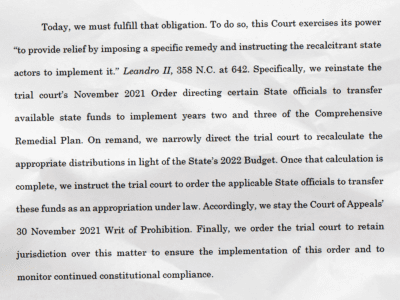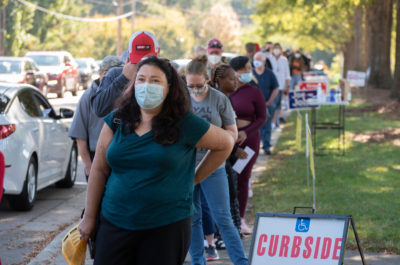
“And we gotta take care of all the children
The little children of the world
‘Cause they’re our strongest hope for the future
The little bitty boys and girls
We got to make this land a better land
Than the world in which we live
Oh, yes, we can, I know we can, can”
Allen Toussaint’s “Yes We Can Can” doesn’t qualify as a Christmas carol or a New Year’s anthem. Still, hearing it again as the old year faded away inspired a mixture of confidence and hopefulness in facing the challenges ahead in 2023.
Toussaint, a New Orleans songwriter, musician, and singer who died in 2015, composed “Yes We Can Can” five decades ago. The Pointer Sisters released their recording of the song in 1973. The written lyrics don’t fully capture the thumping energy and thoughtful spirit that Toussaint brought to his own performances later in life.
Listening to “Yes We Can Can” also led to reflection on how North Carolina has changed and how far it has come over the past half century. The 1970s was a decade of transition and tensions in politics, the economy, and society, leaving imprints that remain on the state of 2023.
On January 5, 1973, Republican James E. Holshouser Jr. took the oath of office as governor. It had been 72 years since a Republican occupied the office. In the General Assembly, Democrats held 70% of the seats in both the House and Senate. Holshouser tangled with Democratic legislators over efforts to strip power from the governor. The divided government of that time was quaintly called the “new situation.”
In 1973, Jesse Helms began his 30 years as a Republican in the U.S. Senate. Holshouser considered himself a center-right Republican. Helms was a hard-right conservative and segregationist. In 1976, the Helms forces won control of the state Republican convention and voted to deny Holshouser a seat as a delegate to the GOP national convention. Helms was a 20th century force in the reconfiguration of the Republican Party that has played out in the 21st century.
For his part, Holshouser sought to demonstrate that Republicans could govern. He rejected calls for a tax cut. Even as he grappled with political matters, Holshouser, a former state legislator, negotiated with Democratic lawmakers. During his four-year term, North Carolina launched kindergartens statewide, established rural health centers, increased appropriations for community colleges and universities, and enacted the landmark Coastal Area Management Act.
“Let us resist the temptation to do too little simply because we can’t do everything,” Holshouser said. “There are things that cry out to be done and they are things that can be done.”
When Holshouser and Helms won in 1972, North Carolina was a state of 5.4 million people, with an economy featuring low-wage, low-skill labor in textiles, tobacco and furniture. Now, North Carolina is a state of 10.7 million, with an economy offering higher-skilled, higher-wage jobs in technology, pharmaceuticals, and finance.
According to Federal Reserve system data, North Carolina’s per capita income rose from $4,491 in 1973 to $56,173 in 2022. (Adjusted for inflation, $4,491 is worth $29,461 today, still much below the current level.) In another chart that only goes back to 1997, the Fed reports that the state’s all-industry gross product, a measurement of its overall economy, rose from $223.9 billion to $662.1 billion in 2021.
If North Carolina could spread public kindergarten statewide in 1973, the state surely can expand pre-kindergarten and infant-toddler care in 2023. A state that extended health care into rural communities in the 1970s surely has the capacity to produce high-quality teachers for rural schools — as well as provide counselors and health professionals to meet the needs of students across the state.
North Carolina can surely do better than rank 48th among the states in per-pupil funding, with the Education Law Center pointing out that, adjusted for inflation, “North Carolina’s funding levels are down 10% from 2008” for its schools.
Political reality points to another year of contentiousness over power, budget, and taxes in a North Carolina government divided among a Democratic governor, legislative Republicans merely one seat short of a super-majority, and a new GOP-majority on the Supreme Court. Of course, democracy itself fosters competition of ideas, personal rivalries, and partisan divisions. Still a song written half a century ago captures a yearning for a democracy that works to solve societal problems and lifts young people up.
“Now’s the time for all good men
To get together with one another
We got to iron out our problems
And iron out our quarrels
And try to live as brothers
And try to find peace within
Without stepping on one another
And do respect the women of the world
Remember, you all had mothers
We got to make this land a better land
Than the world in which we live…
I know we can make it work
I know that we can make it if we try
Oh, yes, we can, I know we can, can
Yes, we can great-gosh almighty
Oh, yes, we can, I know we can, can”




